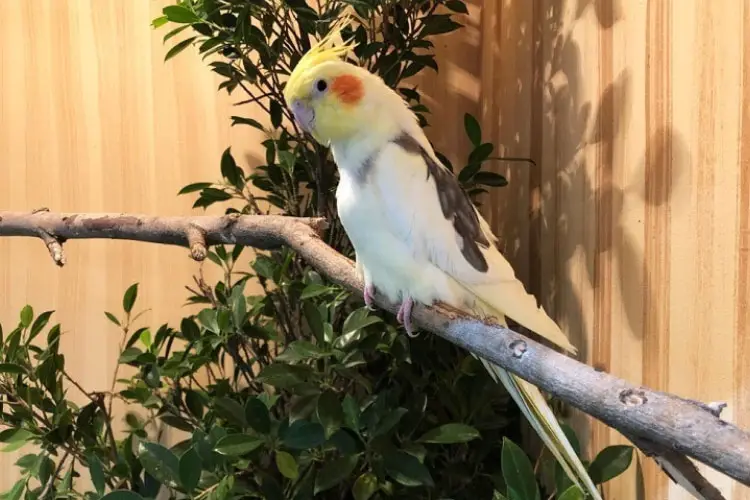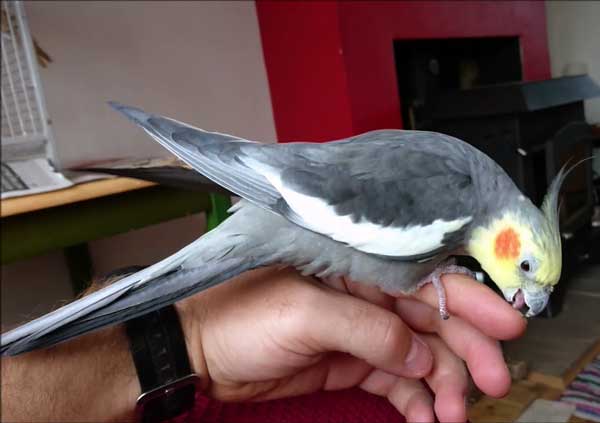Cockatiels are exceptionally bright and communicative small birds. If your cockatiel’s body language conveys a lack of interest, it’s clear that you two need to focus on improving your bond.
But is there any way to know the cockatiel signs of affection? Yes, of course. Cockatiels may express themselves in a variety of ways. We can usually tell what they want based just on their vocalizations and body language, which allows them to transmit a wide spectrum of emotions.
In this article, we are going to talk about 9 ways to know if it likes you or not. As a result, there is no need to look any further because we will provide you with everything you need to know to spot this.
Nine Ways to Know If Your Cockatiel Likes You
If you are confused whether or not your bird likes you, go through the points below to clear all your thoughts.
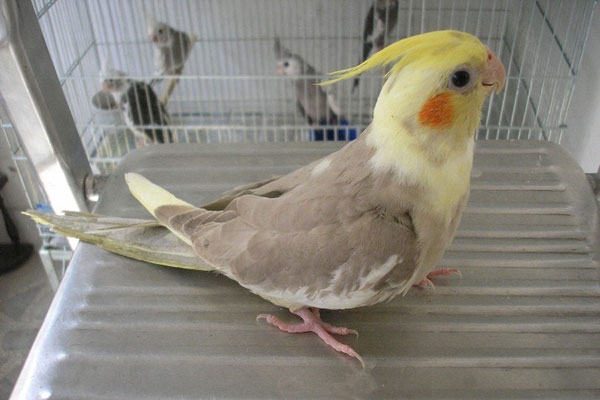
1. Emotionally Attached
If your bird gets excited whenever you come home, it’s a good sign that it likes you. It could show the excitement after you return for a few minutes or quite a while.
There’s a chance it’ll do something completely out of character, like bobbing its head or beckoning you closer. When your tiel is excited, it becomes more interesting and perceptive.
Some birds, upon learning that their owner has abandoned them, may begin to squawk angrily. No matter how loud or animated your bird is when you leave, it will still miss you till you return.
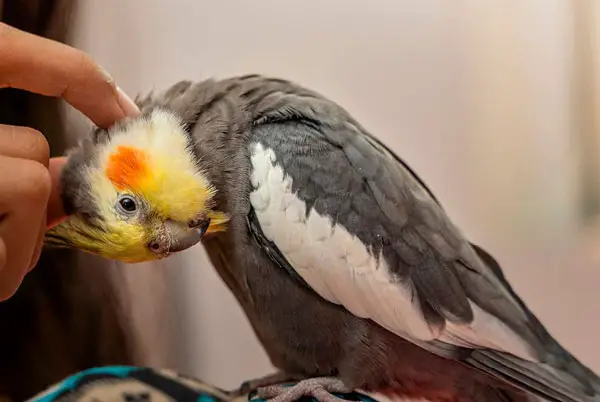
2. Groom You Up
Among cockatiels, grooming is another powerful form of communication between partners.
Unlike what you might think, cockatiels do not only groom each other. They will also groom their human owners, which is a strong indicator of their devotion. Incredible, wouldn’t you say?
This typically manifests as light chewing on your hair or ears. Having your cockatiel groom you is one of the most telltale signs that he or she enjoys your company.
3. Hanging upside down
If your pet is fond of you, it’ll show signs of affection by hanging upside down. As well as being naturally playful, silly, and fond of you, it can hang upside down to impress you, which is a highly indiscreet position for any animal to be in.
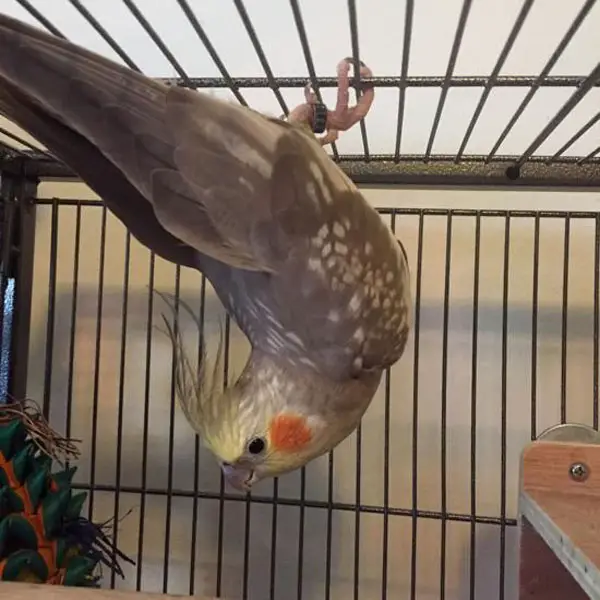
Cockatiels kept as pets often develop a habit of playing while suspended upside down. This habit can eventually spread to other areas of their lives, such as eating and sleeping. Especially when they are pasing happy time with the owner.
You can rest assured that your cockatiel’s upside down position is harmless and they comfortably do that.
4. Wagging wings
One of the most spectacular shows a cockatiel can put on is when it flaps its wings. The mere act of flapping their wings can make even small animals appear enormous.
You should keep in mind that there are numerous possibilities as to why your cockatiel might be flapping its wings.
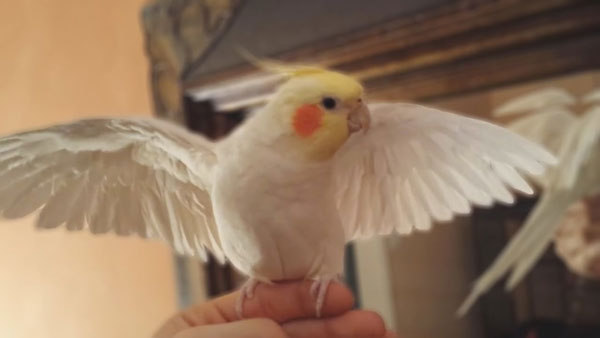
The opposite is true if it flies in place while flapping its wings, which may indicate contentment. The bird will show its approval of you by looking at you or flapping its wings in your direction.
5. Accepting Meal Of Your Hand
Your cockatiel’s attempt to feed you by regurgitating onto your hands is a sign of its affection, as strange as it may seem to humans. Birds have a very different way of thinking than humans do.
6. Warm Soles
Now, if you notice that your cockatiel’s feet are warm, you know that your pet bird is doing well. It’s a sign that she enjoys being in your company.
However, if your cockatiel’s feet are always cold, it could mean that he or she is sick or under a lot of stress.
7. Wagging tails
Since flapping the tail is a common way of expressing many different emotions, you should not automatically interpret it as an expression of joy.
In any case, if you see your cockatiel’s tail flapping in conjunction with other signs of relaxation, you can take that as a good sign that the bird enjoys your company.
8. Promising Body language
If you want to know how your birds react, learning their body language is a must. When its human comes close, a cockatiel who loves him or her will often flit back and forth in the cage or even fly to the front.
Your cockatiel’s enthusiastic body language indicates that it is eager to be released from its cage and spend time with you. Then, what occurs when you finally let it out?
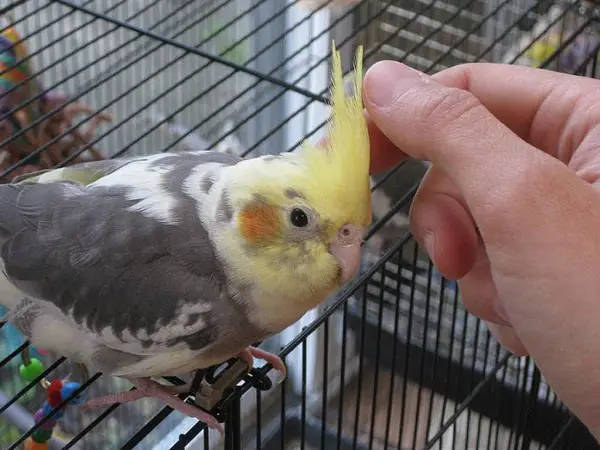
If you release it, it could fly to your shoulder and begin doing things like playing with your jewelry or touching your hair. Cockatiels frequently show physical affection toward one another, and this could be a sign that yours loves you.
If your bird struggles to stay in your grasp or darts to the back of its cage when you approach, it’s probably best to back off and give it some room to maneuver. A cockatoo’s raised foot is an aggressive gesture, so the same rule applies.
9. Protective
Last but not least, it may develop a protective instinct and start guarding you. You can expect it to guard you just as it would its flock in the wild if it loves you. It’s only natural for a bird to be possessive over its loved ones, so if it’s always biting strangers or acting overprotective when you’re around others, it’s probably just being territorial.
To prevent your birds from becoming aggressive and destructive, you should discourage territorial behavior
Are cockatiels capable of recognizing their keepers?
Cockatiels, regardless of the circumstances, can recognize their caretakers, and they are very responsive to the voices of their caretakers.
Cockatiels are smart. You can train them to perform tricks, and they will enjoy making you laugh as much as possible. Cockatiels are, without a doubt, remarkable birds that you can bring into your home.
The species of bird in question responds well to training. Because they are intelligent and friendly once they have formed a bond with their owner, they make an excellent companion for both young children and older people.
What Are The Signs That Your Cockatiel Doesn’t Like You?
If your cockatiel does not exhibit any of the nine behaviors described above, this does not necessarily indicate that it does not like you. Every single cockatiel, just like every other animal, is unique and possesses a distinct personality. It’s possible that your cockatiel isn’t as affectionate as other birds, and that’s perfectly fine.
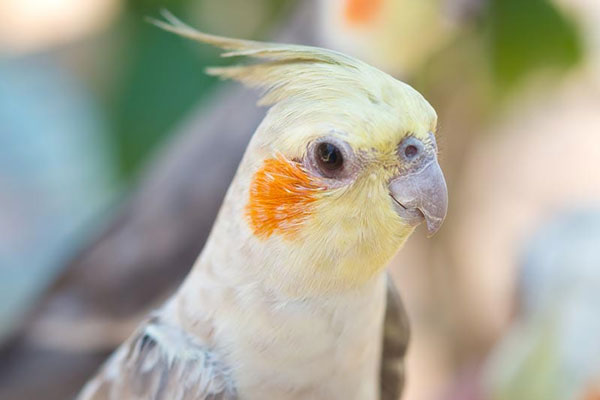
On the other hand, if you are concerned that your bird does not like you, there are a few telltale signs that you should be on the lookout for. These include things like the bird avoiding eye contact with you and acting aloof.
Reduced amounts of vocalizations, screeching, crouching, aggression, plucking of feathers, and self-mutilation are all symptoms of this condition.
FAQs
We know that you might still be surrounded by some questions to ask. For you, we have put up the FAQ section, which can clear up all your ideas.
As was previously mentioned, a cockatiel’s preening of its owner is a sign of affection. It’s a sign of affection and trust if your cockatiel chews on your ear, hair, or nose. By preening, parrots keep their feathers clean and in good condition.
Any name their owners give them, they’ll remember. Nest-born birds of many species are given names by their parents. You will hear it, though you probably won’t know what it is.
Cockatiels have the potential to be affectionate, but not like this. If you take good care of them, they will remember you for many years. But when it comes to dogs, they might be less loyal.
Conclusion
In a nutshell, the cockatiel’s personality can be summed up as one that is cheerful and affectionate. They are friendly birds that form strong bonds of companionship with the people who care for them. In the above article, we have shown you 9 ways to know if it likes you or not. If you have a cockatiel at home, make sure to take good care of it. You might see cockatiel signs of affection with too much devotion, which is the basic reason why you should have these pets.
